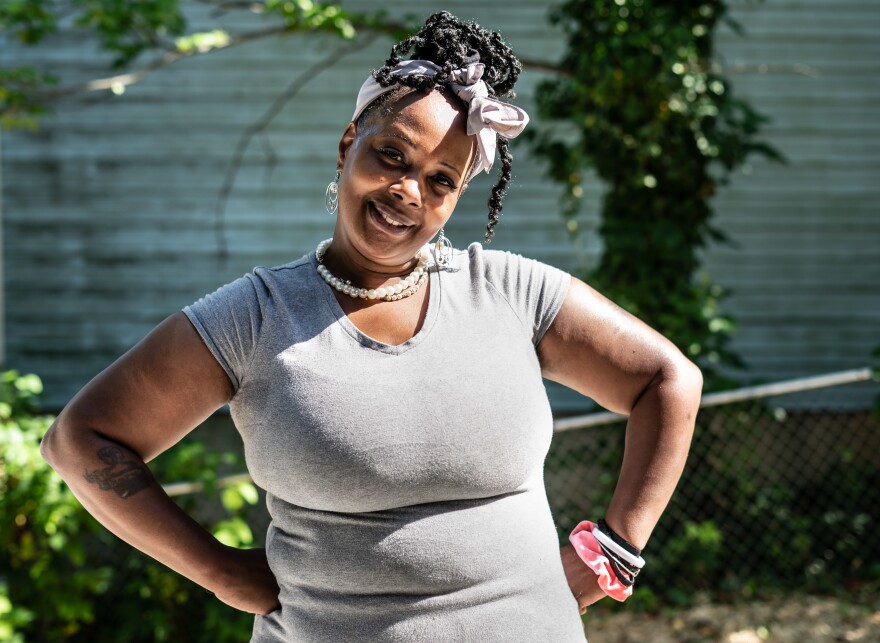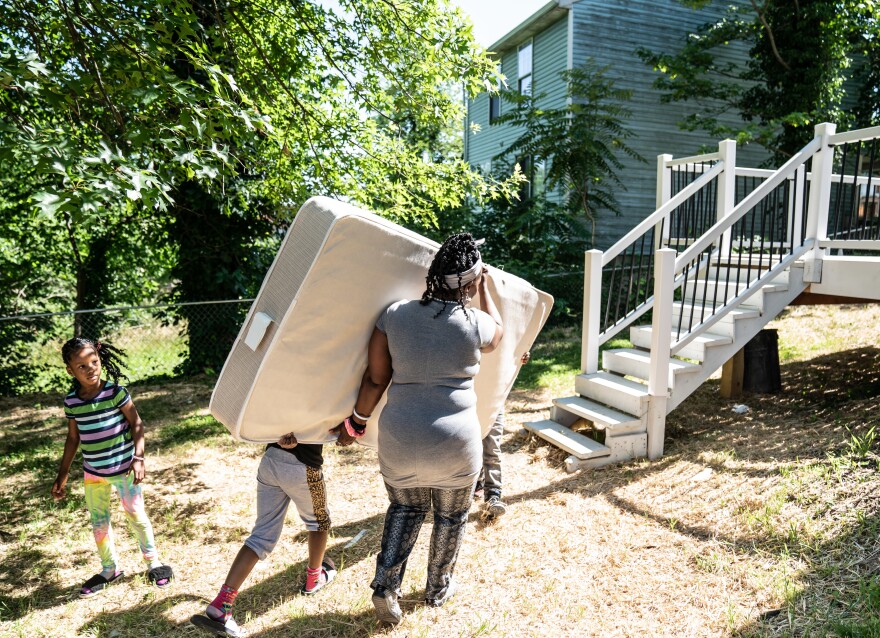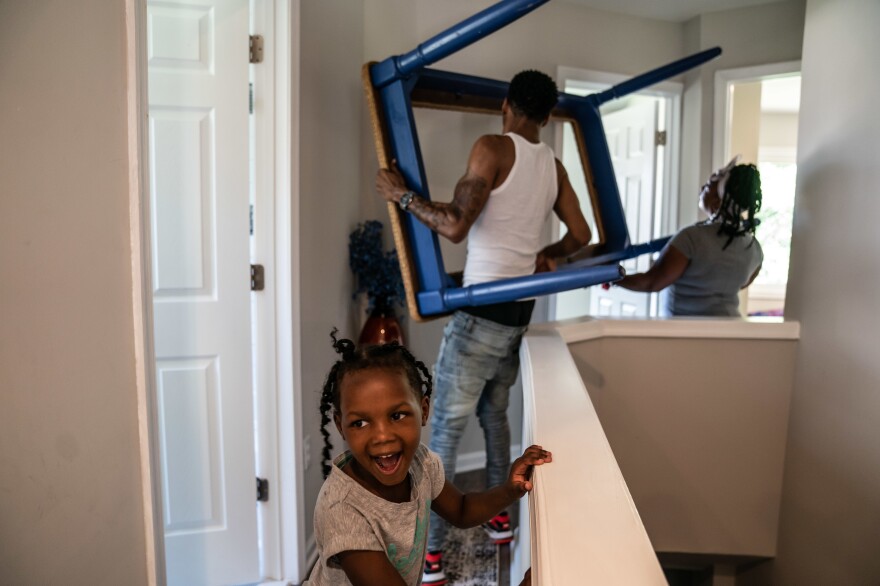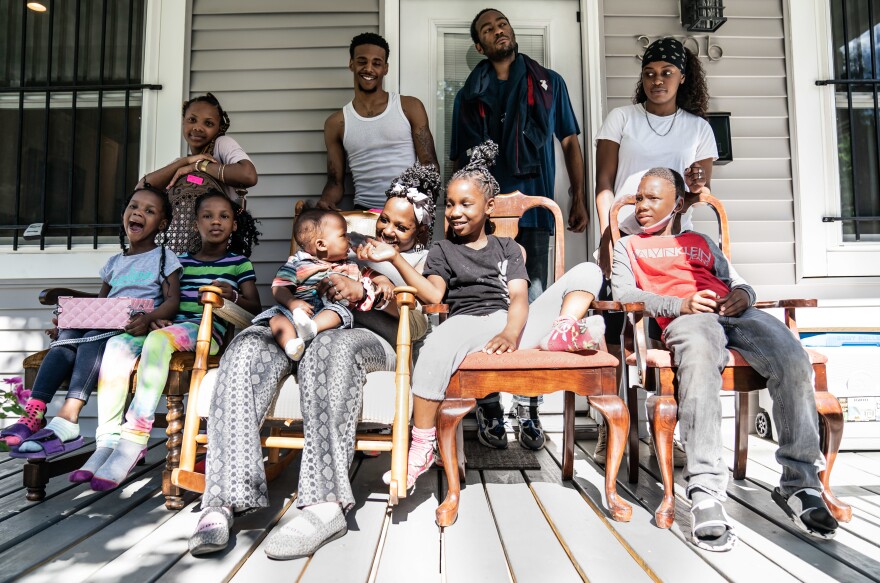Black and Hispanic families in the United States are far less likely than white families to own their own homes. It's been that way for decades, but the gap is wider today than it was before passage of the 1968 Fair Housing Act.
This has led to other racial disparities, such as the ability of families to build wealth or to get a good education.
But efforts are being made to close the gap, especially now that the pandemic appears to have exacerbated the divide.
Tasharn Richardson, of Washington, D.C., is among those who needed help to make that big leap from renting to homeownership.
Loading...
Until recently, the 42-year-old mother of 10 spent her entire life in public or government-subsidized housing. She and her husband, Lionel Richardson, were among the majority of Black families who rent. Only about 42 percent own their own homes.
It's the opposite for white families. A majority — more than 72 percent – own their homes, rather than rent.
To Tasharn, having a house to call her own always seemed like someone else's dream.
So it was with great joy that she recently unlocked the door to her own four-bedroom house. Her children squealed as they ran inside, checking out the freshly painted rooms and choosing which bedroom would be theirs.
But Tasharn only got to this point through a combination of sheer determination, luck and a great deal of financial aid. Her salary working for the D.C. government wasn't enough to qualify for a mortgage, and her husband is unemployed. So she was able to secure more than $100,000 in down payment assistance — from the D.C. government and a foundation, called birdSEED — which helped whittle her payment down to a manageable $1,900 a month.

She also worked with a financial coach provided by another local nonprofit, called A Wider Circle, and spent countless hours taking classes to learn the basic skills needed to buy a house.
"Being able to have your finances in order. Also learn about the credit. That's, you know, a big piece," she says, adding that these were things she never learned about growing up.
That's the case for many low-income buyers. They're often the first in their families to buy a house, so their parents can't necessarily show them the way.
Another local nonprofit, Manna, helps fill the void, working with first-time home buyers such as Tasharn to become "mortgage ready."
That includes getting credit scores up and being prepared to handle all the expenses associated with taking care of a house.

"Budgeting. I can't stress it enough," Robin Lewis, director of Manna's homeownership programs, tells those who signed up for a recent online orientation. "You need to budget. If you don't budget, if you don't know what you got, you're going to have a hard time getting anywhere."
Manna's President and CEO Sasha-Gaye Angus says the ultimate goal is to chip away at the intergenerational poverty that afflicts so many of the people they serve.
"We're so far behind in the wealth gap that we've got to start somewhere," Angus says. "And so creating wealth through homeownership is really the lowest hanging fruit for Black and brown families to really get a leg up."
The numbers are startling. The average Black family has only one-eighth the wealth of the average white family — $23,000 compared to about $184,000. And much of that difference is due to the lack of home equity.

Michael Neal, a senior research associate at the Urban Institute, says these disparities, which resulted from years of housing discrimination, are self-perpetuating. Homeowners simply have more resources than renters to get ahead.
"That is, the degree to which I can use my housing equity to invest in my human capital, that is to get an education. To use my housing equity to start a small business. To do all those things that ultimately bring additional wealth," says Neal.
The pandemic has helped to widen the gap, with Black Americans more likely than whites to get sick with COVID, to lose work and to fall behind on their rent. That makes it harder for families to save for a house, which is especially troubling at a time when home prices have begun to soar.
In fact, Tasharn — like many buyers today – found herself in a race against time. Her newly renovated, but modest-sized house cost $475,000, not unheard of in D.C.'s hot real estate market. Last year, the same house sold for half that amount. Next year, it likely would have been out of reach.

Neal thinks, without some major intervention, the outlook for low-income home buyers is bleak. "Our analysis suggests that, unfortunately, these gaps are not going to close," he says.
But there are efforts being made to narrow the divide. The Biden administration has proposed hundreds of billions of dollars in spending and tax breaks to increase the supply of affordable housing, and it has vowed to enforce laws against housing discrimination.
It's also working on plans to provide down payment and other financial assistance for first-time home buyers, which could be a big boost. A recent analysis by the Joint Center for Housing Studies at Harvard found that giving low-income families $15,000 for a down payment could help almost 1.5 million Black and Hispanic renters buy homes, and substantially reduce the homeownership gap.
Housing and Urban Development Secretary Marcia Fudge has also announced that the Federal Housing Administration is revamping the way government- backed mortgages are structured to lower barriers, such as student loan debt, that are especially burdensome for Black and Hispanic buyers.

"We just want to be sure that we can make those people who can pay their rent now, most of whom can afford to pay a mortgage...just assist them to get over the hump," Fudge recently told Senate appropriators.
But it's not clear how far Congress is willing to go to help people over that hump. Republicans are opposed to Biden's massive new spending proposals. And some have raised concerns about pushing people into the housing market if they're not financially ready.
The Urban Institute's Neal also cautions that doing too much to boost sales — without doing enough to increase the supply of affordable housing — could inadvertently make home prices higher.
That said, there's broad interest in addressing a problem that's plagued the country for decades. Lisa Wise, founder of the birdSEED Foundation, notes a simple fact: white home buyers are far more likely than Black home buyers to get financial help from their families. In her case, she used $8,300 from the sale of a car she inherited to buy her first house, a duplex, which she then turned into a rental.
"That $8,300 windfall changed my entire life, I mean absolutely changed everything about my life trajectory," says Wise. "And so many people will never have that opportunity, will never have that windfall."

Which is why her group decided to give $10,000 grants to first-time Black and Hispanic homebuyers, like Tasharn, to help with their down payment and closing costs.
Tasharn hopes it will eventually turn into a windfall for her children, if only for the lessons they've learned over the past year. She says her kids — especially her teenage daughter — have been her strictest financial advisers.
"When we would go out shopping, grocery store, no matter what it is, she would tell me, 'Hey Mom. Hold up. Do we need this? Do we need that? Aren't we planning on buying a house one day? Didn't you say we're going to be moving? And we're not just renting, we're buying?'" Tasharn recalls.
She says that at least is something she can pass on.
Copyright 2021 NPR. To see more, visit https://www.npr.org.



